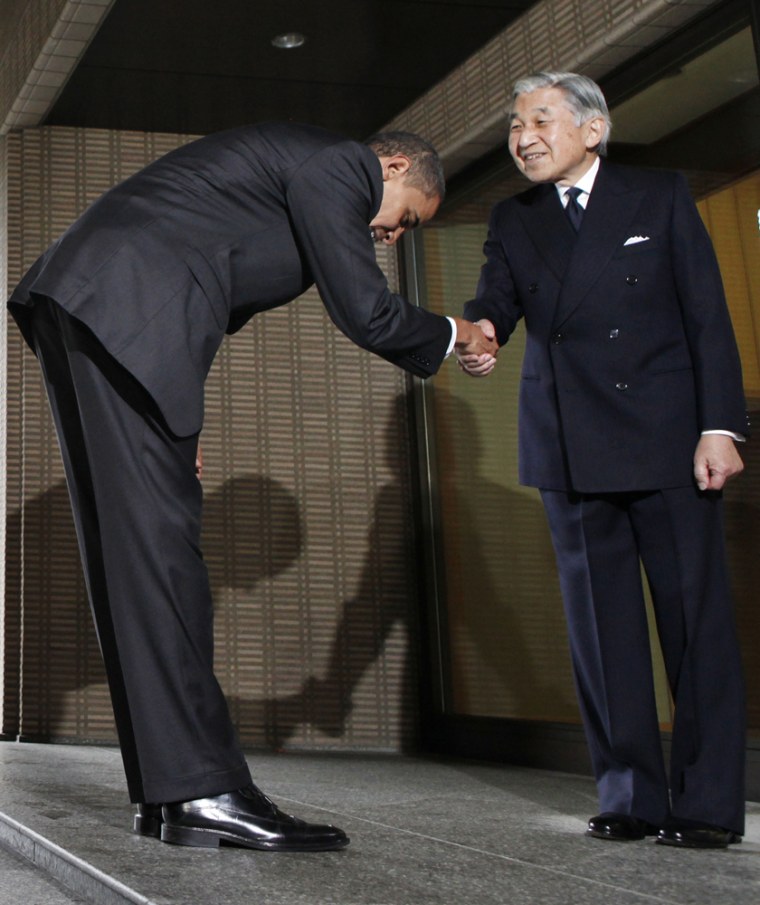Some American conservative commentators are seizing on President Barack Obama's deep bow to Japan's emperor during the weekend, accusing the U.S. commander in chief of groveling to a foreign leader.
Obama greeted Emperor Akihito, whose father ruled when Japan bombed Pearl Harbor in 1941, with a simultaneous handshake and nearly 90-degree bow, sparking furious online commentary, much of it negative.
Obama's gesture on Saturday was not without precedent, however. Neither was the outrage.
U.S. presidents from both political parties often have been criticized for attempts at culturally sensitive greetings to high-ranking foreigners.
Former President George W. Bush, a Republican, was mocked for holding Saudi Crown Prince Abdullah's hand, a traditional sign of friendship in the Middle East, as they strolled together in 2005.
In 1994, former Democratic President Bill Clinton was criticized for almost bowing to Akihito. The resulting image, The New York Times wrote, was of "an obsequent president and the emperor of Japan."
Bow comes at difficult time
Former President Richard Nixon, a Republican, can be seen in a Life magazine photo from 1971 bowing to Akihito's father, Emperor Hirohito.
Obama's awkward encounter with Akihito — bows are not meant to accompany physical contact — is not even the first time the president, a Democrat in office less than a year, has been criticized for his greeting of a foreign leader: Critics accused him of genuflecting to Saudi King Abdullah at a world economic summit this year.
The current bow comes during a highly charged political time in the United States. Conservatives are strongly opposing Obama's policies, especially his plan to overhaul the U.S. health care system, and they have seized on any perceived stumble by the president to support their message on talk radio and in blogs.
An online video posted by the University of Connecticut College Republicans juxtaposes a series of upright handshakes between Akihito and other world leaders with Obama's low bow before the emperor.
Andrew Malcolm, in a blog on The Los Angeles Times Web site, asks: "How low will the new American president go for the world's royalty?"
Obama's bow was compared with photos of former Vice President Dick Cheney giving Akihito a straight-backed handshake and Gen. Douglas MacArthur standing with his hands on his hips next to Hirohito.
‘Sign of respect’
State Department spokesman Ian Kelly told reporters Monday that the bow was "a sign of respect to the emperor."
In an online State Department posting from 2007 titled "Protocol for the Modern Diplomat," envoys are advised to be aware of greeting rituals such as kisses, handshakes or bows and to follow a country's tradition. "Failure to abide with tradition may be interpreted as rudeness or a lack of respect for colleagues," it says. It was not clear whether the guidelines apply to the president.
John Park, a senior researcher at the United States Institute of Peace think tank, said it is a respectful tradition for visitors to bow to the emperor in a formal setting.
But, he said, "We're in an environment right now where everything is hypersensitive. Any type of move that you do, there will be some group that sees some sort of message within all that."
The furor in the United States over the bow also shows how delicate any trip by Obama would be to Hiroshima and Nagasaki, the Japanese cities destroyed by U.S. atomic bombs at the end of World War II. Obama has said he wants to visit the cities sometime during his presidency.
